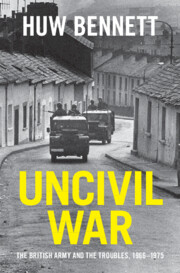Book contents
- Uncivil War
- Cambridge Military Histories
- Uncivil War
- Copyright page
- Dedication
- Contents
- Figures
- Maps
- Tables
- Illustrations
- Abbreviations
- Introduction
- 1 Baggage
- 2 The Army’s Short-Lived Ulster Honeymoon
- 3 Escalation and the Erosion of Impartiality
- 4 Edward Heath’s Bid for Victory
- 5 The Road to Bloody Sunday
- 6 The Most Deadly Year
- 7 Strategy in the Shadow of Loyalist Power
- 8 We Cannot Envisage Peace
- Conclusion
- A Note on Sources
- Acknowledgements
- Notes
- Bibliography
- Index
1 - Baggage
Published online by Cambridge University Press: 03 August 2023
- Uncivil War
- Cambridge Military Histories
- Uncivil War
- Copyright page
- Dedication
- Contents
- Figures
- Maps
- Tables
- Illustrations
- Abbreviations
- Introduction
- 1 Baggage
- 2 The Army’s Short-Lived Ulster Honeymoon
- 3 Escalation and the Erosion of Impartiality
- 4 Edward Heath’s Bid for Victory
- 5 The Road to Bloody Sunday
- 6 The Most Deadly Year
- 7 Strategy in the Shadow of Loyalist Power
- 8 We Cannot Envisage Peace
- Conclusion
- A Note on Sources
- Acknowledgements
- Notes
- Bibliography
- Index
Summary
This chapter traces the origins of the Troubles in Northern Ireland from the mid 1960s, depicting the British government’s ignorance about the Province and reluctance to get involved. The chapter assesses the development of British military thinking about insurgency, arguing the army reflected on the lessons of the decolonisation wars, and realised the tactics used in the colonies would not be suitable in the future. The army’s deliberate intellectual decolonisation before 1969 made it much harder for soldiers to accept later on that others might perceive their actions to be inherently colonial. The chapter shows how the Ministry of Defence began to consider what might happen if the disputes on the streets of Northern Ireland got more serious. From an early stage, defence planners and ministers feared a civil war, and this fear shaped decision-making for years to come. Northern Ireland was viewed by the British as a home nation, therefore deserving support, but also deeply alien in political and social terms. The government’s decision to delay sending in the army for as long as possible made the task of restoring order more difficult, as the local police force’s credibility evaporated, and Catholic communities looked beyond the state for protection.
Information
- Type
- Chapter
- Information
- Uncivil WarThe British Army and the Troubles, 1966–1975, pp. 13 - 37Publisher: Cambridge University PressPrint publication year: 2023
